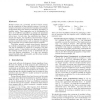Free Online Productivity Tools
i2Speak
i2Symbol
i2OCR
iTex2Img
iWeb2Print
iWeb2Shot
i2Type
iPdf2Split
iPdf2Merge
i2Bopomofo
i2Arabic
i2Style
i2Image
i2PDF
iLatex2Rtf
Sci2ools
118
click to vote
POPL
1996
ACM
1996
ACM
Using Parameterized Signatures to Express Modular Structure
Module systems are a powerful, practical tool for managing the complexity of large software systems. Previous attempts to formulate a type-theoretic foundation for modular programming have been based on existential, dependent, or manifest types. These approaches can be distinguished by their use of different quantifiers to package the operations that a module exports together with appropriate implementation types. In each case, the underlying type theory is simple and elegant, but significant and sometimes complex extensions are needed to account for features that are important in practical systems, such as separate compilation and propagation of type information between modules. This paper presents a simple type-theoretic framework for modular programming using parameterized signatures. The use of quantifiers is treated as a necessary, but independent concern. Using familiar concepts of polymorphism, the resulting module system is easy to understand and admits true separate compilati...
Modular Programming | POPL 1996 | Programming Languages | Separate Compilation | Simple Type-theoretic Framework |
Related Content
| Added | 08 Aug 2010 |
| Updated | 08 Aug 2010 |
| Type | Conference |
| Year | 1996 |
| Where | POPL |
| Authors | Mark P. Jones |
Comments (0)

